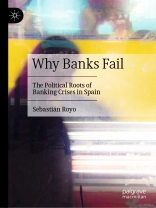This book examines the political roots of banking crises in Spain. It focuses on the process of political bargains in which parties with different interests come together to form coalitions, and it shows how these coalitions have determined banking outcomes and caused banking crises in Spain. In particular, it analyzes the 2008 Spanish banking crisis and shows how Spanish banks and related savings institutions contributed significantly to the challenges that led to the crisis, including the fueling of a large property bubble – by channeling tremendous credits to the construction and real estate sectors, while starving the country’s productive sectors. Accordingly, the book links banking crises to the country’s larger institutional malaise, placing the solution not only in the hands of the banks, but also the political institutions that influence them.
表中的内容
Chapter 1. Introduction. Spanish Banking: How Do We Explain a History of Fragility?.- Chapter 2. The Origins of the Spanish Banking System.- Chapter 3. Spanish Banking in the Twentieth Century.- Chapter 4. From Boom to Bust: The Economic Crisis in Spain (2008-13).- Chapter 5. The Global Financial Crisis and the Spanish Banking System: Explaining its Initial Success (2007-10).- Chapter 6. A ‘Ship in Trouble.’ The Spanish Banking System in the Midst of The Global Financial System Crisis (2010-12).- Chapter 7. Bank Bargains and Institutional Degeneration.
关于作者
Sebastián Royo is Visiting Scholar at Harvard University’s Minda de Gunzburg Center for European Studies, and Professor at the Department of Political Science & Legal Studies at Suffolk University, USA.












